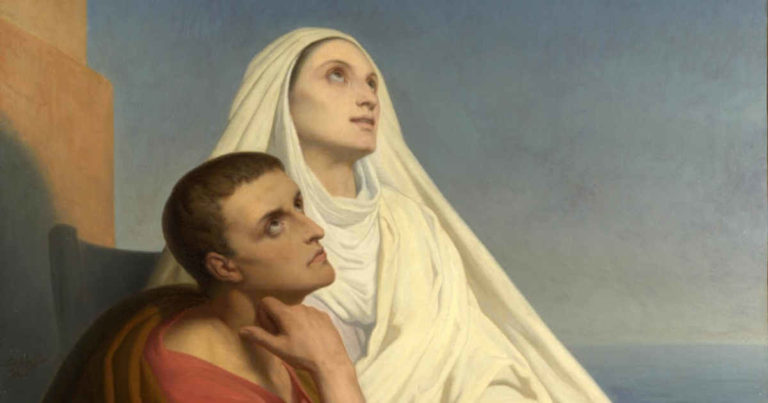By Mike Aquilina
Mike Aquilina is executive vice-president of the St. Paul Center for Biblical Theology and a contributing editor for Angelus News. He is author of more than fifty books, including The Fathers of the Church and Villains of the Early Church. He hosts the “Way of the Fathers” podcast for CatholicCulture.org and edits the Reclaiming Catholic History series for Ave Maria Press.

No one had more complicated thoughts about friendship than Augustine, who died in the year 430 at the age of 75. That may be partly because we have so much of his writing, and over a long life his opinions must have developed. In fact, the scholar J. T. Lienhard identifies a definite progress in Augustine’s thinking on the subject. In the beginning— fresh from his classical education—Augustine picked up Cicero’s ideas almost verbatim, including Cicero’s definition of friendship as “a perfect conformity of opinions upon all religious and civil subjects, united with the highest degree of mutual esteem and affection.” But as Augustine matured, he began to see the complexities of the subject, and how they eluded Cicero. And he begins to see a new source of friendship. It’s not the agreement on religious and civil subjects that makes friends. It’s the grace God gives us that allows us to love others and become friends. That means the only real friendship is Christian friendship.
Paulinus of Nola was a rich senator who gave up everything to live an ascetic life. Augustine and Paulinus became great friends through letters, even though they had never met. Paulinus thought a real Christian could be happy to have such a spiritual friendship, but Augustine insisted that seeing a friend in person was still a big part of friendship.
O excellent man and excellent brother, there was a time when you were unknown to my mind; and I tell my mind to bear patiently your being still unknown to my eyes, but it almost— well, I should say completely—refuses to obey.
Does it indeed bear this patiently? If so, why then does a longing for your presence rack my inmost soul? For if I were suffering bodily infirmities, and these did not interrupt the serenity of my mind, I might be justly said to bear them patiently; but when I cannot bear with equanimity the privation of not seeing you, it would be intolerable if I were to call my state of mind patience.
Nevertheless, it would perhaps be still more intolerable if I were to be found patient while absent from you, seeing that you are the sort of person you are. It is a good thing, therefore, that I am unsatisfied—because if I were satisfied with this privation, everyone would justly be dissatisfied with me.
What has happened to me is strange, yet true: I grieve because I do not see you, and my grief itself comforts me; for I neither admire nor covet a fortitude easily consoled under the absence of good men such as you are. For do we not long for the heavenly Jerusalem? And the more impatiently we long for it, do we not the more patiently submit to all things for its sake? Who can so withhold himself from joy in seeing you, as to feel no pain when you are no longer seen? I at least can do neither; and seeing that if I could, it could only be by trampling on right and natural feeling, I rejoice that I cannot, and in this rejoicing, I find some consolation. It is therefore not the removal, but the contemplation, of this sorrow that consoles me.
Do not blame me, I beg you, with that devout seriousness of spirit that so eminently distinguishes you. Do not say that I do wrong to grieve because of my not yet knowing you, when you have disclosed to my sight your mind, which is the inner man. For if, when traveling in any place, or in the city to which you belong, I had come to know you as my brother and friend, and as one so eminent as a Christian, so noble as a man, how could you think that it would be no disappointment to me if I were not permitted to know your dwelling? How, then, can I do anything but mourn because I have not yet seen your face and form, the dwelling-place of that mind which I have come to know as if it were my own?
But when you are reading these, my holy Paulinus, let not those things which Truth has spoken by my weak instrumentality carry you away so much that they prevent you from carefully observing what I myself have spoken. If you drink in with eagerness the things good and true which have been given to me as a servant, I do not want you to forget to pray for the pardon of my errors and mistakes. In anything you see that justly displeases you, you are seeing me myself; but in anything in my books that you approve, through the gift of the Holy Spirit bestowed on you, you should love and praise the One with whom is the fountain of life, and in whose light we shall see light, not darkly as we do here, but face to face (see 1 Cor 13:12). When I read over my writings and discover anything that is due to the working of the old leaven in me (see 1 Cor 5:7), I blame myself for it with true sorrow; but if anything that I have spoken is, by God’s gift, from the unleavened bread of sincerity and truth, I rejoice with trembling.
—Augustine to Paulinus, Letter 27
You Might Also Like
Friendship and the Fathers brings together, for the first time, the Fathers’ doctrine and stories of friendship—mostly in their own words. Popular author Mike Aquilina shows why friendship changed the world—and why we need another revolution of friendship today.
